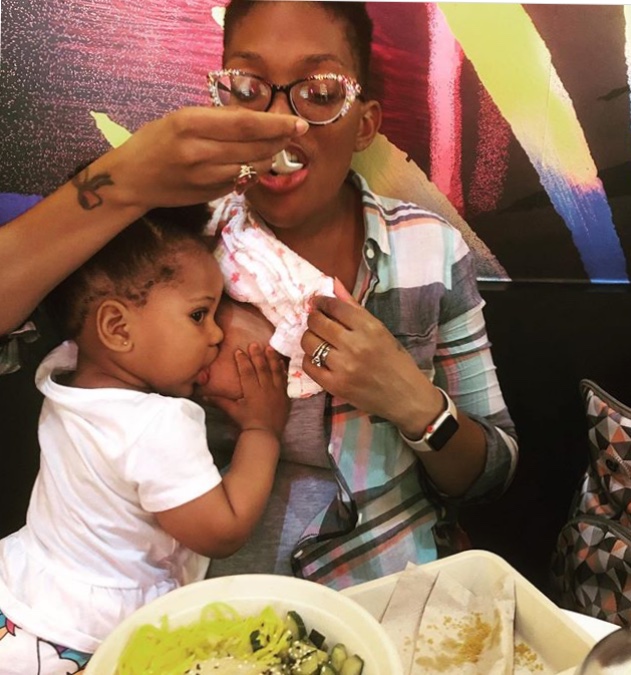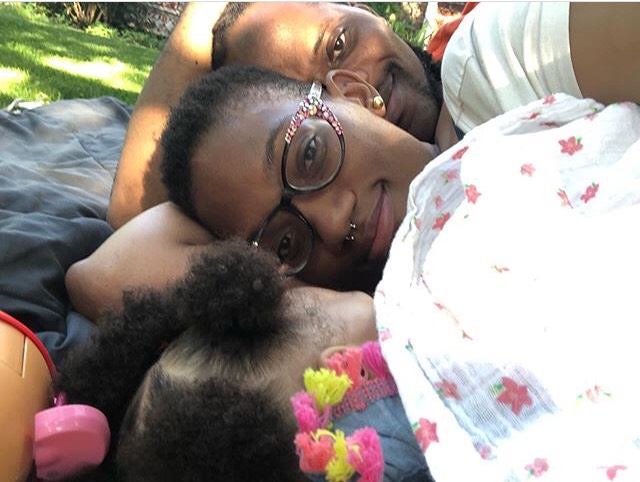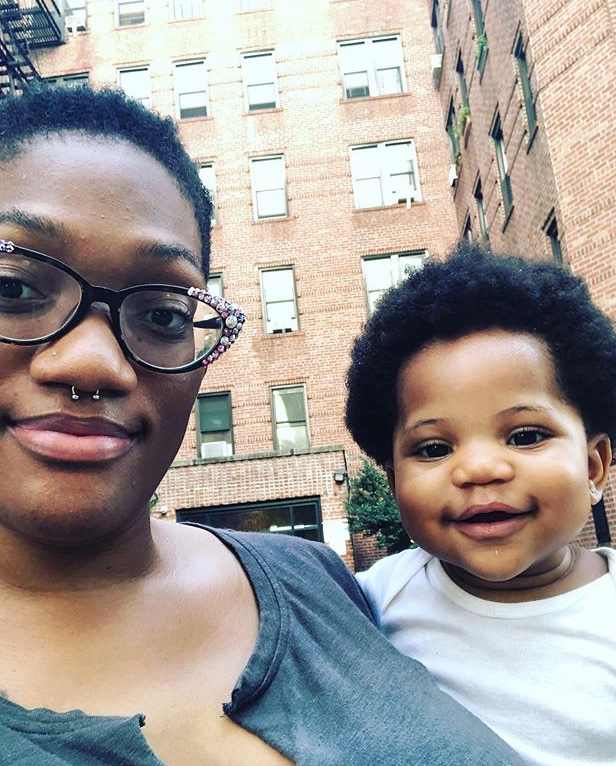Black Breastfeeding Week: Sexuality, Raw Nipples & Nourishing Your Baby
Black Breastfeeding Week: How Breastfeeding Affects Your Sexuality, Heals Chaffing Nipples & Nourishes Your Baby - Page 2
Share the post
Share this link via
Or copy link

Source: Imani L. Whyte-Anigboro / Imani L. Whyte-Anigboro
This week is Black Breastfeeding Week. Black women have the lowest rate of breastfeeding initiation and duration. There are a variety reasons that contribute to this disparity. In honor of this week, we spoke to Imani L. Whyte-Anigboro, mother to one-year-old Oghenebrume “Brume” Naomi Anigboro, shares the highs and lows of breastfeeding for over a year.
What influenced your decision to breastfeed?
Well one, just being completely transparent. I was not then and I’m not now, in a good financial place and breastmilk is free. So yes, I was like this is the healthiest thing for my baby. But I was also like, ‘I don’t have money.’ Formula is super duper expensive. And I was like, ‘I don’t have it.’ So if my body allows me to do this, God willing, this is what I really want to do. And the more I learned about it—I have a lot of friends who have done it. So I had a lot of support from my friends and my husband was supportive. My mom did it for 3 months and 4-5 months with another one. But the first thing was money.
Did you ever consider not breastfeeding because of the way your breasts would change afterward?
No because— and I heard that too. One of the ladies in my nail salon said, ‘I didn’t breastfeed because I don’t even have a lot of breast but I didn’t want them to be saggy afterward.’ And I get that. My whole spiel has been and still is that my husband is somehow going to find the money to give me the Mommy Makeover of my dreams since I’m having all of his children. They can get fixed. They can get lifted up and put back into the place where they never were. Because I’ve never had perky boobs anyway. I’ve always been in the D cup range for the majority of my adult life. They ain’t never been to the sky anyway. It ain’t nothing but a bra, some tape or a doctor. Still, I don’t care. They’ll get fixed and I’m not worried about catching no man. I already got one.
Love MadameNoire? Get more! Join the MadameNoire Newsletter
We care about your data. See our privacy policy.
Black women have the lowest breastfeeding rates. Why do you think so many Black women are resistance to the idea of breastfeeding?
I think it’s support. They don’t have the people. It’s definitely something you need support on because there were times in my journey where I was taking it day by day, feeding by feeding. It’s hard. I was blessed. My baby latched immediately. She did the chest crawl and in less than five minutes, she was on the tit, getting the milk out. But that didn’t make it any less painful. I have a heavy let down on one side of my breasts where every time she nurses, regardless of which side, I can feel the milk coming out. Naturally, it comes out of both sides regardless, so I can feel it coming out. And that’s uncomfortable for some people.
Also, the same hormone that’s released when you have an orgasm is the same one that’s released when you’re breastfeeding. It’s the same hormone but you’re not having an orgasm. You might get a little tingly downstairs and that’s not appealing. I don’t want to feel sexual while my child’s eating either but it doesn’t affect me in a large way. But if you’ve been sexually assaulted or you don’t know that that can happen, it could be a deterrent. If no one told you that could happen, and then it happens, you might think that something is wrong with you. You don’t have anyone to talk to about it, you’re embarrassed, lack of knowledge.
I also just think Black women don’t do it because we work a lot. I don’t know what my breastfeeding journey would be like if I worked a 9-5. You have to be at work pumping three times a day. I hear stories daily in my support groups about supervisors not being supportive, companies that are not supportive. Having to go to HR because it is the law but who wants to be fighting their boss? No one wants animosity at work. So sometimes you just deal with the b*llsh*t. But when it comes to feeding a child, how much are you willing to deal with?
Also, there was a woman in one of my mommy groups and someone was talking about breastfeeding and she likened breastmilk to semen. She said it’s a bodily fluid like semen. I was like, ‘What. sis?!’ These are the things we’re up against in our own communities where you think breastmilk and semen are the same thing. So you will drink from the cow that you don’t know but you don’t want breastmilk in the refrigerator? People don’t know. There’s an ignorance about it.
My family, I love them to death but my aunt was like—when Brume was 10 or 11 months— ‘You still breastfeeding that baby? You need to give her some formula!’ And it’s like why do I need to give her formula? Can you tell me why? They’ll say things like, ‘’You’re sacrificing your time.’’That baby need to sleep and that breastmilk won’t make her sleep because it’s too thin.’
When you’re doing something people have not done, you’re going to get pushback from it. And a lot of people aren’t going to tell their mother and grandmother what do to. Because they’ve [raised children.] You did it 30 years ago. You don’t know what I know now. But it’s hard to tell your mother, ‘I know what I’m talking about and you don’t.’ Regardless if you’re an adult or not.
Breastfeeding is looked upon as poor and I don’t know why.
Also, women are sexualized.
And no one more than Black women.
Black women are straight fetishized. We are more than sexualized, we are fetishized. That’s also what aids in that.
But as you were talking, it made me think about slavery and how so many Black women were denied the opportunity to feed their babies or they had to use their milk to feed White babies so it’s looked at as poor or a position of subservience as opposed to I’m doing what my body was made to do to take care of my child.
For years, up until now there are Black women who are raising White babies now. And they’re not with their children. If it’s money involved or it’s a job, then it’s okay but if it’s to take care of your child, for some reason, it’s not. So I think that’s a lot of the reason why it.
And breastfeeding can have an affect on your mood. For a lot of women, it’s depressing for them. Because your hormones. You know how they say, it takes a year after you have a baby for your body to get back to normal? Well, when you’re breastfeeding, it’s a year after when you stop breastfeeding. Your hormones are still fluctuating. They’re all over the place.

Source: Imani L. Whyte-Anigboro / Imani L. Whyte-Anigboro
How has breastfeeding affected your sexuality?
I think that breasts look nice but I’ve never been big on sexual stimulation through my breasts in my sexual experiences. So when I tell him I don’t want him touching there right now because I’m feeding our child from there, I’m not losing out sexually on anything. He might be but he’ll be aight.
It took a long time for my sex drive to come back. Maybe like 7-ish months. I just wasn’t feeling very sexual. I just didn’t care about it. I was focused on taking care of my child. For me—this does not happen for every woman—but for me, I don’t have a period now that I’m breastfeeding. But I’m still ovulating and I can still technically get pregnant. The chances are lower but you can. But you don’t know when you’re ovulating if you don’t have a period. Before, when I had a period, I knew when it was coming because I turned into a tiger. I would be like jumping my husband’s bones. I would be extra horny. But now, I don’t know.
I look at my breasts as a feeding vessel, not a sexual vessel. Do I want to look good in my clothes? Yes but I’m like nope Brume uses that for food.
I think my sexuality has been stagnant from my body changing as a whole. My stomach is different. My gut is just different. So I’m having sex with a sheet across my stomach even though my husband could care less.
Because the same hormone is released when you breastfeed and when you orgasm, soemtiems milk leaks out of your breast. Some women and men are aroused by that and be letting it slide down and their man licks it up. I’m not a part of that group so I wear a shirt or a bra. Because if I see milk, I can’t do it. Nope. Libido gone. I can’t even see my baby when I’m having sex. I can’t be facing her. For some people that doesn’t affect them. I think motherhood has affected my sexuality. You just look at your body because you’ve seen it in a different light. But it doesn’t make me want to stop breastfeeding because feeding her is more important than sex.

Source: Imani L. Whyte-Anigboro / Imani L. Whyte-Anigboro
You shared a video of a woman saying they don’t want to be touched because they feel like their body is being used by everyone. And they want time where no one is touching them.
Yeah. You just feel over-touched. I feel that all the time. That’s me and my husband’s biggest thing. First of all, his love language is touch and affection. That’s not my love language and it never really has been. I’m constantly having my daughter claw at me because she wants to sit on mommy or she wants to hug mommy or she’s pulling my shirt down to nurse. There’s somebody constantly on me. Then my husband comes on me and he wants to kiss on me and rub on my neck. And I’m like, ‘Yo, can everybody give me 50 feet.’ I’ll tell him sometimes and he has toned down but you pray for a man to love you and God be like, ‘Here.’
Feeling over-touched is a real thing and it’s a daily struggle for me because I don’t have time alone ever…or very rarely. Because I’m her primary childcare provider. My husband works all day, then at night we co-sleep. And with breastfeeding, it’s dumb easy. I don’t have to get up. She still night nurses. She’s eating when she breastfeeds but she doesn’t take a pacifier like some babies do. So she nurses for comfort. I’m her literal pacifier.
Can you speak about the nutrients a child gets from breastmilk? And how long do babies need the nutrients breastmilk provides?
I am not a certified lactation anybody but the research I’ve done, the recommendation is three years. It used to be two but now it’s three. And that’s with the baby eating solid foods. So they’ll only be drinking breast milk in a cup or a bottle, at night or in the morning. So when people say they’re breastfeeding until 3 or 4, 9 times out of 10, they’re not pulling out their tit. It’s usually in the morning, at night, as a snack, in a cup, with a meal.
The nutrients. They receive everything. Everything you’re supposed to receive as an adult, they receive that and then some. Every single vitamin you take in, they get. The good, the bad, the ugly. Not only do they receive nutrients, they receive exposure to flavors. So they tell you don’t limit your palate because a breastfed baby is tasting what you taste. One day I ate a bunch of Oreos and I tasted my breastmilk and it tasted sweet. There was a time when I was eating regular food and it didn’t taste as sweet as it did with the Oreos. Those flavors are coming through in my milk, whereas a formula-fed baby doesn’t get that until you introduce solid foods into their diet.
My pediatrician told me that the only vitamin that doesn’t come through as much in breastmilk is vitamin D. So sometimes pediatricians will prescribe vitamin D drops for breastfed babies because they might end up with a deficiency. There are people in the breastfeeding community who feel like this isn’t true. To be completely honest, I didn’t give Brume the drops because the one they prescribed had a lot of sugar in it. She’s had her blood tested and she has no vitamin D. deficiency so she’s fine.
You said something about having knots in your breast. What is that about?
Engorgement. In the first 6-8 weeks, your body is just producing milk. It takes that long for your milk to regulate, meaning your body knows how much milk your baby needs, how much milk your baby is taking in. But before that your body is just making, making, making. And it can make a lot. And if you don’t get it out, it gets stuck. Your milk ducts get clogged because they’re so full. And literally your breasts feel hard. If the milk is really backed up, you can feel the knots in your breast and if you don’t get it out, it can cause mastitis and that is when you have an infection and you have to get a prescription. That’s another reason they tell you not to pump before six-eight weeks because your body hasn’t regulated.
And your body learns everyday. If your baby is going through a growth spurt and nursing a lot and you feel like there can’t possibly be any more milk, your body will make more to accommodate the baby feeding more.
What do you do to prevent chaffing and all that type of stuff?
For me, creams didn’t work. You kind of have to air it out, let the breasts hang free. Pressing a bra over brokem skin and bruised breasts wasn’t helpful for me. And after baby stops nursing, hand express it and rub the milk itself on the breasts and it will heal itself. And just let it air dry. It will heal itself. The milk will heal yourself.
That’s fascinating.
Breast milk is like what Windex was to the grandfather in My Big Fat Greek Wedding. You can use breast milk for pink eye. Your baby got eczema, put it in their bath water, it’ll help their skin. If they have congestion, squirt the breastmilk up their nose. It helps them to not have diarrhea, to not be constipated. You name it, breastmilk will fix it.
When you are sick, you should breastfeed your child, barring you’re on some medication that will harm your baby. As soon as you get sick, your body is actively building antibodies. And with breastfeeding, those antibodies go straight to your child. So your child won’t get sick and will be able to fight sicknesses that will come to them in the future. But people don’t know these things.
Any doctor or lactation consult and doctor will tell you that the colostrum the comes out when you first give birth is very important. It’s very thick and that’s why it hurts so much at first. But it’s all vitamins. It’s just literally a smoothie of vitamins coming out of your breasts. So even if you don’t plan to breastfeed, I would strongly suggest that you at least those first 3-4 days to let your baby get that colostrum, whether you decide to pump it out or let your baby nurse. Because those vitamins are vital and once they’re gone, they’re gone.
What are the other benefits, the things you feel fortunate enough to have experienced because you’re breastfeeding?
The benefit is the bond. There’s a bond that is unmatched because I’m breastfeeding. There are times when I’m breastfeeding and we just stare at each other. She’s pulling at my face and loving on me and I’m loving on her and I feel blessed not only to be your mom but to be your mom in this way. And that makes me thankful and happy. As tired as I feel, I just feel so happy. Also, I don’t have to pack bottles. The bond, the convenience and she’s healthy. She’s healthy and happy. Not to say that other babies aren’t healthy and happy but mine is. And she just so happens to be breastfed. Also a huge benefit is that they still cannot duplicate it. They can’t duplicate something that changes from hour to hour. And again I can’t stress enough how much money I’m saving.
I didn’t know that I would like breastfeeding as much as I did. I knew it was something I wanted to do for my child but I didn’t know I would fall in love with it the way I did. I don’t mean how people say, ‘I just want to breastfeed my child all the time because I’m in love with her.’ No. I mean like I’m amazed by what my body has allowed me to do. And I want other women to know what I know and feel this feeling. And to have these options for their baby. I want moms to know as much as they can know. I feel like I have a future in lactation consulting. I feel like it’s in my path to do this for women. Like on some Erykah Badu sh*t. She’s still a singer but she’s also delivering babies. I’m going to be a fashion designer extraordinaire but I’m also going to be giving mothers knowledge and helping them in their breastfeeding journey to the best of my ability.
Yes, breastmilk is best milk but I’m not trying to make anyone feel bad. But I want them to know. If you know everything I’m telling you and you still decide nah, cool. It’s your baby, it’s your body. But you just need to know.
Related Tags
black breastfeeding week black motherhood black mothers breastfeeding DoNotUse_2 sexuality






